22 Oct 2024
How Veterinary Practice Management Software Boosts Clinic Efficiency and Care
Matthew Connor
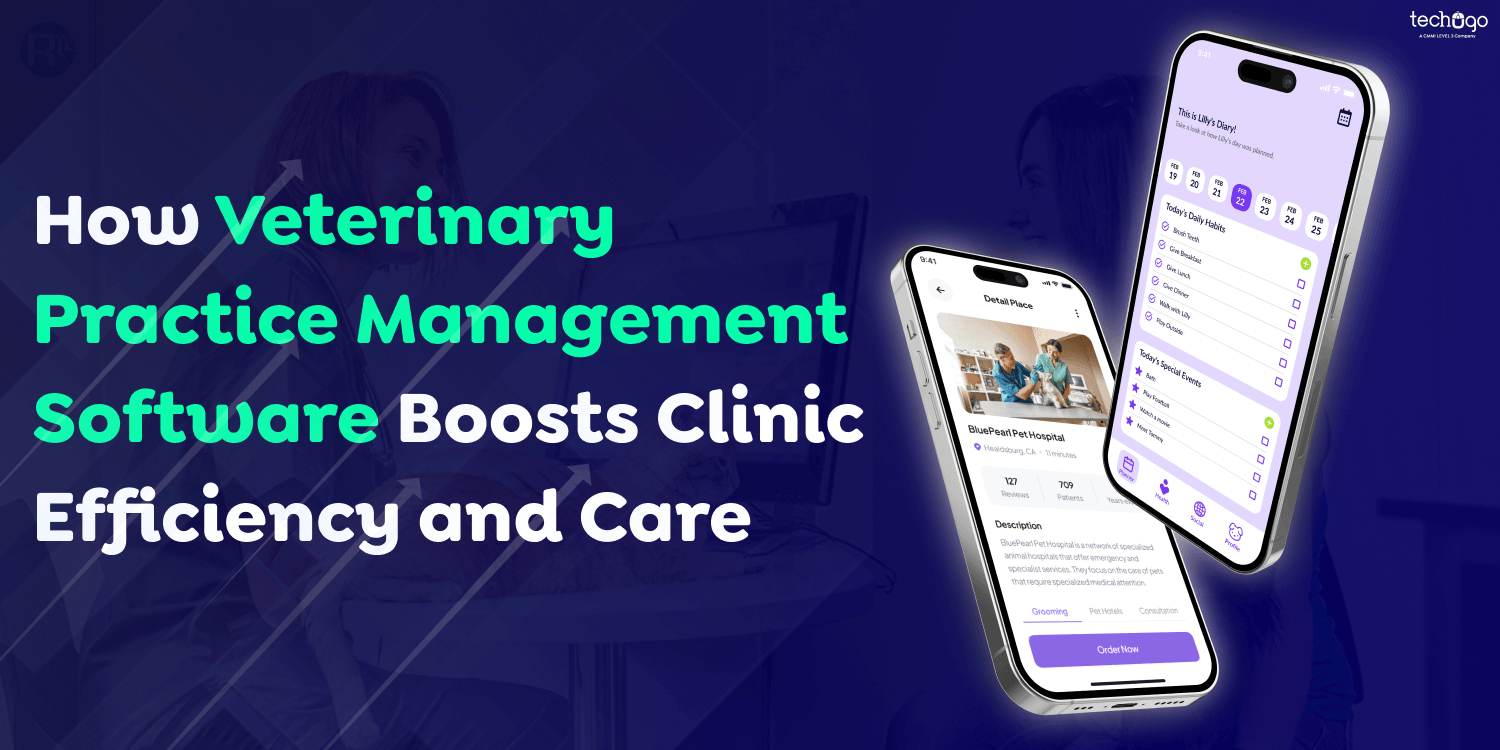
Is running your veterinary business giving you much trouble? Veterinary practice management software can make a huge difference in how appointments are handled, medical notes are kept, and communication with pet owners is easy. Companies seek to invest in developing software for managing veterinary practices. The field that veterinary medicine covers is evolving due to new software designed to manage veterinary practices.
This software helps clinics and professionals do their jobs more efficiently. A report from Grand View Research says that the world market for veterinary software was worth $1.29 billion in 2023. It is expected to grow at a CAGR of 12.6% and reach $3.02 billion by 2030.
This blog aims to give you a full picture of best veterinary practice management software development by explaining its process, valuable features, and business benefits and technology trends in depth.
So, let’s begin!
What is Veterinary Practice Management Software?
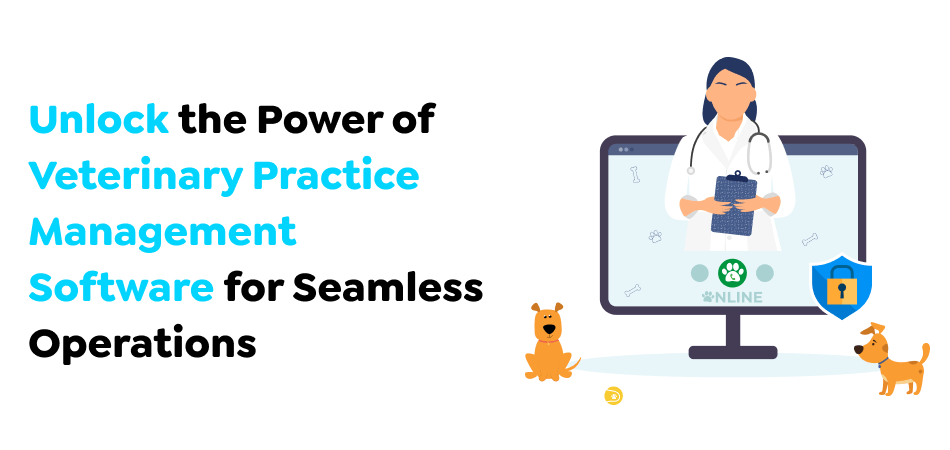
Veterinary practice management software can make a veterinary practice’s daily tasks more accessible and efficient. It’s basically an all-in-one system that helps run the business by keeping track of everything from patient information and appointments to finances and staffing.
Veterinary practice management software can help clinics be more productive, care for patients better, and run their businesses by automating routine chores and giving helpful information.
So, if you are interested in investing in developing veterinary practice management software, the best option is to consult with a software development company in Canada.
Also Read : Transforming Operations: The Role of Oil and Gas Software Development
How Does Veterinary Practice Management Software Work?
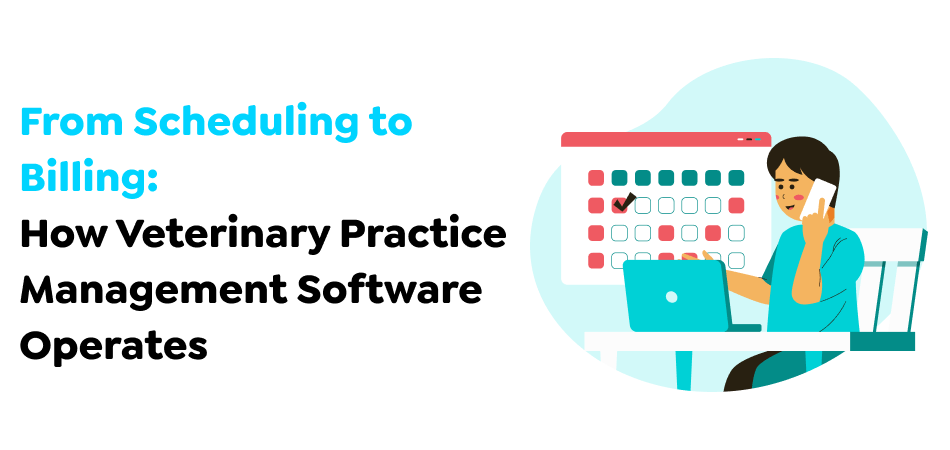
Veterinary practice management software streamlines operations, enhances patient care, and increases financial efficiencies for veterinarians. Here’s an outline of its steps in action:
Data Entry
Every aspect of patient data (name, breed, owner details, and medical history) is entered into the system in steps such as DATA Entry.
Scheduling and Appointments
This software efficiently schedules appointments, optimizing resource use. Reminders are automatically sent to clients, decreasing missed appointments.
Patient Check-in and Examination
As patients arrive, they are checked in using software provided by the veterinarian, who then can access their animal’s medical history before performing an exam.
Treatment and Prescription
The software helps document treatments, procedures, and medication prescriptions. It can also generate prescription labels and track inventory.
Billing and Payment
Our software calculates fees based on services rendered, generates invoices, and can integrate with payment gateways for secure online or in-person payment processing.
Reporting and Analytics
Veterinary practice management software offers valuable insights into practice performance. Reports can be generated to analyze financial information, patient demographics, and key performance metrics.\
Also Read : The Complete Guide to POS Software Development: Types and Benefits
Types of Cloud-based Veterinary Software
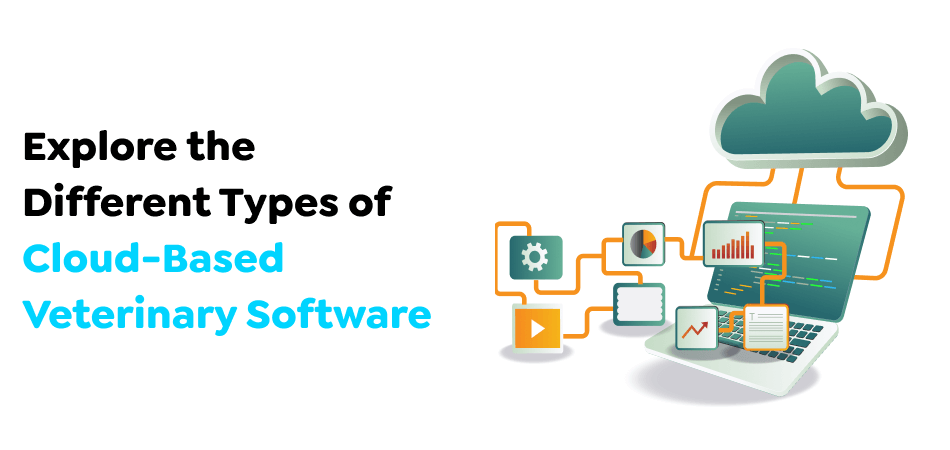
Understanding the various types of cloud-based software for vets will help veterinarians develop the ideal solution to meet their requirements. These are the most popular kinds:
Practice Management Software
Practice management software simplifies administrative tasks, such as appointment scheduling, client communication, invoices, and inventory management. It centralizes patient records, treatment plans, and billing details, making it simpler for vets to run the day-to-day operations.
Electronic Health Records (EHR) Software
EHR software can digitize patient health records, including medical histories, treatment plans, laboratory results, and diagnostic imaging. Cloud-based EHR systems allow immediate access to patient data anytime, allowing effective collaboration between veterinarians.
Laboratory Information Management Systems
LIMS software manages laboratory workflows, such as monitoring test results, sample management, and data analyses. Cloud-based LIMS solutions provide scalability and data security, allowing vet practices to run their lab operations efficiently.
Imaging and Diagnostic Software
Imaging and diagnostic software allow for recording, storing, and analyzing diagnostic images, such as ultrasounds, X-rays, and MRIs. Cloud-based imaging solutions provide advanced visualization tools and secure storage of diagnostic images.
Telemedicine Platforms
Telemedicine platforms facilitate virtual consultations between pet owners and veterinarians. These platforms work with EHR systems to provide remote access to recipient records, increasing the quality of care provided to pets.
Client Communication and Engagement Software
Client communication software allows veterinarians to interact with pet owners through messages, appointment reminders, and educational resources. Cloud-based solutions increase engagement with clients and enhance overall customer satisfaction.
Revenue Cycle Management Software
RCM software is a system for processing claims, billing, and revenue generation for vet practices. Cloud-based RCM solutions can automate billing workflows, decrease the number of billing errors, and improve revenue collection.
Compliance and Regulatory Software
Software that helps with compliance and regulation can aid veterinary practices in adhering to the latest standards and regulations, such as HIPAA and GDPR. Cloud-based compliance solutions offer tools to protect data, audit trails, and the reporting required by regulatory agencies.
Cloud-based software for veterinary use offers various options to meet the varied requirements of veterinarian practices. Whether managing operations daily, enhancing patient care, or improving client communication, cloud-based software development is essential in modernizing veterinary practice and ensuring high-quality pet treatment.
Also Read : Driving the Future: A Comprehensive Guide to Automotive Software Development
Features of Veterinary Software for Your Startup Practice
When you choose a PIMS to start your business, look for specific options to maximize efficiency and savings once you begin your practice. These include:
Comprehensive appointment scheduling
A well-organized scheduling system is vital to maximizing your available time. Choose a software program with intuitive and flexible scheduling options compatible with your clinic’s workflow. Online booking options, automated reminders, and calendar sync can help decrease no-shows and improve scheduling.
Electronic medical record (EMR)
A reliable EMR system assists in streamlining the patient’s care by centralized sizing all patient data in one location. EMRs give instant access to patient records and help provide timely and precise treatment. This improves efficiency and cuts down time devoted to administrative tasks.
Inventory management
Effective inventory management can prevent overstocking and stockouts, both of which could be expensive. Find software that offers real-time monitoring, automated reordering, and precise reporting and easily integrates into inventory management software that provides these benefits. These tools can assist you in maintaining optimal inventory levels, decreasing waste, and making money.
Integrated payments
A fully integrated payment system that includes electronic invoicing and automated billing could improve cash flow and lessen administrative burdens. The integration should accommodate a variety of payment options and provide options like electronic invoicing, tokenized cards-on-file payments tracking, and financial reports. This means you will be paid on time and keep precise financial reports.
Client communication tools
Communication with clients is crucial to creating a loyal customer base. Many PIMS provide integrated communication tools, including SMS, email, and notifications for mobile apps. Automated reminders,low-ups, and educational content may increase your clients’ satisfaction and engagement and help grow the practice.
Analytics and Reporting
Data-driven decision-making is crucial for any business to be successful. Find software that offers comprehensive analytics and reports on the most important indicators of performance (KPIs), such as appointment volume and revenue, retention of clients, and much more. These data can assist you in identifying areas of improvement and help you make an informed decision about your strategy.
Benefits of Veterinary Practice Management Software
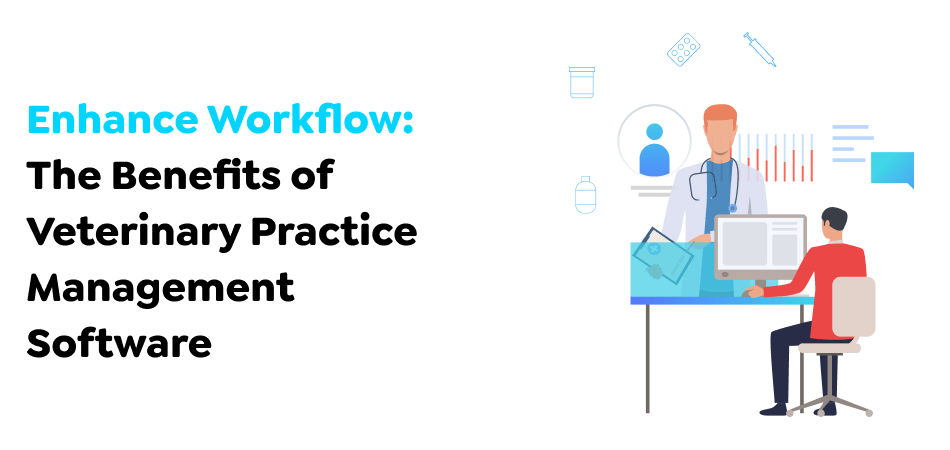
The veterinary industry is evolving, and one of the key advancements is the adoption of cloud-based software. This technology offers numerous benefits for veterinary practices, from improved efficiency to enhanced patient care. Let’s explore some of the key advantages of veterinary software:
Streamlined Administrative Operations
Admin staff must keep tabs on HR management, communication, billing and finance, overall management, and regulations. Practice management software allows staff in each department, including veterinary practitioners, to track and manage tasks electronically.
Each staff member is given access rights to handle the assigned work. Practice management software helps to optimize appointment bookings for vets, giving patients the opportunity to choose their preferred slots.
In a veterinary facility or clinic where hundreds of animals visit, it’s hard to maintain their profiles manually. Hence, veterinary practice management software helps keep records of all animals, including unique IDs, contact details of pet owners, medication, surgeries, etc.
Boost User Engagement
Veterinary practice management software boosts user engagement by including a self-scheduling feature for booking appointments. This eliminates long queues and busy phone lines.
Communication is one essential method for keeping consumers/users engaged and developing a robust consumer-provider relationship. With mobile communication—texting, mail, or calling—pet owners can reach out to vets for queries or quick treatment tips. Ease of access to communication decreases the chances of cancellations or no-shows.
Consider incorporating links that direct users to Whatsapp messaging or emails to bolster interactivity.
Centralized Data Storage
The top veterinary practice management software powered by cloud storage is accessible on any device with a network connection. Vets can access medical records through any device and provide care remotely to animals.
Cloud-based storage is less expensive than a server-based solution, as purchasing cooling equipment, hardware, or servers is optional.
A cloud-based solution increases the scalability of practice management software, as it’s easy to integrate new features as a veterinary practice grows. In addition, cloud-based software can integrate with different cloud-based healthcare and business-related solutions, increasing interoperability.
Also Read : How Offshore Software Development is Shaping Global Business Growth
Development Process for Veterinary Practice Management Software
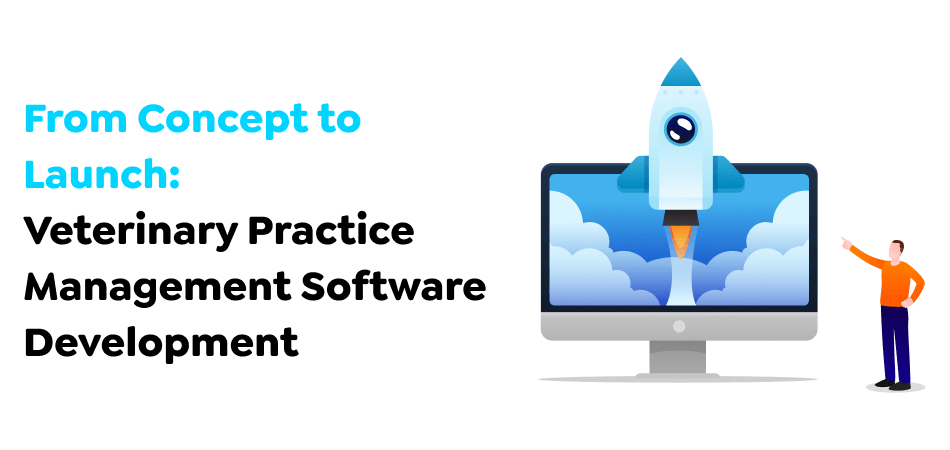
Developing successful software for managing practices involves several important steps, from knowing the user’s requirements to ensuring it is safe and scalable. This section will help you in this process:
Understand Your Requirements
Know and Assess the Specific Needs For Each Practice Evaluate and determine any individual practice’s requirements, such as medical or legal. Assess its workflows, pain points, and requirements, such as appointment scheduling, client management, billing/invoicing systems, EHR case management platforms (such as Medisoft), reporting analytics tools, and communication solutions.
Research and Plan
Define the Project Scope Set project objectives, including features, timelines, and budget. Draft detailed requirements documents while gathering an expert healthcare app development company like Techugo.
Design User-Friendly Software
Develop intuitive and user-friendly designs. Make the software simple for all users by eliminating clicks and streamlining workflows, and then conduct usability testing to refine its design further.
Establish the Software
As you consider future growth and integrations, select technologies that ensure performance, scalability, and security. Employ agile methodologies for software development in iterations. Conduct regular reviews to check progress and revise plans as necessary.
Compliance and Security
Compliance with industry regulations and standards must be rigorously observed, and policies must be reviewed regularly to maintain compliance. Advanced security measures designed to secure data, including conducting regular security audits and updates, must also be implemented to maintain optimal operations.
Test Your Software
Conduct thorough tests of software features intended by its developer to detect bugs or defects that affect its function, speed, and responsiveness, as well as stability under various conditions and vulnerabilities that need fixing to protect sensitive data and ensure compliance with industry standards and regulations.
Deploy the Software
Establish hosting, servers, and other necessary infrastructure. Draft an implementation plan to reduce downtime and ensure an uninterrupted launch process. Deploy the software into its intended live environment while monitoring initial usage rates and quickly responding to any immediate problems that may arise.
Gather Feedback and Improve
Employ surveys, direct communication tools, and analytics solutions to collect user feedback regarding their experience with your software. Based on user comments and new requirements, incorporate updates and enhancements that improve functionality, performance, and security into periodic updates.
Maintain and Support
Regular updates should be issued to keep software operating at optimal levels while promptly responding to bugs or issues as they arise. Support should be provided through various channels, such as email, chat, and phone support services, and comprehensive documentation and training resources should be offered to assist users.
Also Read : Unlock the Future of Software Development: Key Trends in 2024
Cost To Develop Veterinary Practice Management Software
Veterinary practice management software development costs can range from $10,000 to $25,000. Numerous factors influence the overall development cost, such as feature complexity, technological innovation, UI/UX design, and team location.
Below is the healthcare software development cost breakdown based on the different complexity levels of the software.
- Simple Veterinary Practice Management Software: $10000-$15000
- Medium Veterinary Practice Management Software: $15000-$20000
- Complex Veterinary Practice Management Software: $25000+\
By evaluating the overall project scope and complexity of cloud-based veterinary practice management software, businesses can get a fair idea about the investment required for developing an in-depth solution.
Tips for Choosing the Right Veterinary Software to Help You with the Start-up Practice
In particular, a cloud-based PIMS offers numerous advantages to help new practices reduce setup costs and manage operations more efficiently. Here are some tips for choosing the right veterinary software:
Connect to Cloud
Cloud-based software can eliminate the initial costs of a traditional on-premise PIMS, which includes servers, hardware, and IT infrastructure. When you use a cloud-based system, all you require is an internet connection. This software runs on the provider’s servers, which means you’ll be able to avoid the bulk of the cost associated with setting up and running an internal IT system.
Seek Out Subscription-Based Pricing
A subscription model lets you spread the cost over a period of time. Instead of having to pay a massive amount in the beginning, you can pay a smaller amount monthly or annually. This pricing model is especially ideal for small businesses that have limited starting funds. It allows you to manage your funds more efficiently and also invest in other important areas of your business.
Reduce IT Maintenance Costs
Maintaining an on-premise system will require you to manage IT support for updates, security, and troubleshooting. Cloud-based PIMS service providers manage maintenance and updates, assuring that your software stays current with the most recent technology and security protocols. Therefore, there’s no need to pay for in-house IT support or expensive IT support services.
Learn More About the Possibility of Scaling
As your startup grows and your requirements change, so will your needs. Choose a PIMS that can quickly scale as you grow. This means you can begin with the basics you require and upgrade to additional features as your business grows. Scalability lets the only cost you pay is the features you require when you’re in need while avoiding unnecessary costs for features you do not currently need.
Look for Remote Accessibility Capabilities
Cloud-based software is accessible anywhere you have Internet access. This can be a huge benefit for new practices that do not have a full-time staff. It is possible to manage appointments, view patient records, and complete other important tasks from a distance. This could also eliminate the need for extensive office space at first, making it easier to set up costs.
Prioritize Data Security
Data security is an essential aspect of any veterinary practice. Cloud-based PIMS providers invest heavily in security encryption, frequent backups, and compliance with industry standards. A new method could set up a new. The level of protection is prohibitively costly itself. Utilizing cloud-based software, you can achieve enterprise security grade without the expenses.
Also Read : The Ultimate Guide to Healthcare CRM Software Development: Enhance Patient Care
Technology Trends in Veterinary Software
Examine some of the biggest technological developments in cloud-based software for managing veterinary patients, which will determine the direction of the vet field.
AI-Powered Diagnostic Tools
AI algorithms are capable of analyzing medical images, such as X-rays and MRIs, helping veterinarians identify ailments like tumors, fractures, and other abnormalities faster and more precisely.
Predictive Analytics
AI can analyze vast quantities of data through EHRs (EHRs), lab tests, and other sources to detect and prevent animal health issues. This will enable vets to provide proactive care and improve results.
Telemedicine and Remote Monitoring
Artificial Intelligence-powered platforms that support telemedicine permit vets to monitor their pets’ health and behavior from a distance, allowing them to provide prompt intervention and advice for pet parents.
Drug Discovery and Development
Artificial Intelligence-driven algorithms analyze genetic information and identify potential pharmaceutical candidates for veterinary medicine, speeding up the process of finding new drugs and expanding animal treatments.
Personalized Medicine
AI can analyze genetic and clinical information to design treatment plans tailored to each animal, considering their unique health background and genetic composition.
Chatbots and Virtual Assistants
Chatbots powered by AI and Virtual Assistants provide pet owners with immediate access to information and advice that enhance communication and improve clients’ overall experience.
Robotics in Surgery
AI-powered robots are used in veterinary surgeries to carry out complex procedures with high precision and accuracy, reducing the possibility of complications while increasing effectiveness.
Behavioral Analysis
AI can assess pet animals’ behavior patterns to spot potential health issues earlier, which helps veterinarians identify and treat illnesses earlier. Using Natural Language Processing techniques, AI can detect subtle indicators of health issues that promptly require treatment.
Natural Language Processing
NLP technology enables veterinarians to study and access numerous research papers to make informed decisions.
Data Security and Privacy
Since artificial intelligence technology uses AI to collect and process personal data, security and privacy become crucial. Software developers designed for veterinarians have implemented strict security measures to block unintentional access to data or data breaches.
AI Development services have revolutionized the field of veterinary medicine, improving diagnosis accuracy, increasing the effectiveness of treatments, and delivering individualized treatments. As AI advances in veterinary technology continue to advance, it is possible to see further innovative applications that are set to revolutionize the practice of medical veterinary medicine.
Also Read : In-House vs. Outsource Software Development: Key Factors to Consider for Your Project
Conclusion
Establishing a practice in veterinary medicine is an expensive financial investment. However, the correct software to manage your veterinary practice will help you reduce the cost of setting up and running your business more efficiently.
Offering lower initial costs with subscription-based pricing, lower IT maintenance expenses, and scalability, cloud-based PIMS is a cost-effective solution for new owners.
The most significant features are the complete schedule for online medical record inventory management, billing and invoicing tools, client communication tools, and analytics to improve efficiency and cut costs.
When your practice expands, the adaptability and integration capabilities, constant updates, and improved collaboration provided by cloud-based PIMS ensure your software will grow with your requirements and help ensure your practice’s long-term success.
Get in touch with us today to discover how our veterinary practice management software can optimize your clinic’s operations and improve patient care!
Get In touch
We are excited to here from you and let’s start something special Together. Call Us for any inquiry.
Write us
sales@techugo.caJust a call away
About you




